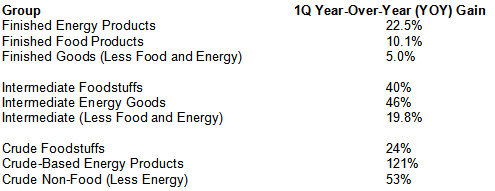Forex Trader Top 3: Food and Fuel Price Effects, Retail Numbers, GBP Going Down
Mark Whistler is the founder of www.WallStreetRockStar.com and is the author of multiple books on trading. Mark’s newest book, The Swing Trader’s Bible – co-authored with CNBC/Fox News regular guest Matt McCall – will be on shelves in late summer, 2008. In addition, Mark also writes regularly for TraderDaily.com and Investopedia.com.
Sign up for a free trial to Forex Force with Mark Whistler, a twice-daily alert service from professional trader Mark Whistler featuring intraday and swing trading setups. Click here to start your free trial.
1. Food and Energy Fuel U.S. Inflation
The News:
Producer prices jolted upward by 1.1% in March, with 0.9% of the increase coming from food and energy.
The Breakdown
Get ready for these numbers… Year over year, 1Q 2008 price increases (as reported by the Bureau of Labor Statistics) were:

The Bottom Line:
Food and energy prices are killing the economy. If you look at the crude foods stuff price increases of 24%, it’s common sense that while farmers are getting higher prices for grains, some of their increases have been offset by higher energy and fuel costs.
Moreover, Intermediate processors are seeing dramatic increases, which only hurts the backbone of America in the end. Finally, finished food product prices only increased 10.1% in the first quarter, indicating that costs are not being passed onto consumers… They will be though; it’s just a matter of time.
I keep saying it in this column and I’ll say it again… the only way commodity and energy prices will cool (helping the economy recover) is if world governments remove protectionist policies, like the United States 54-cent a gallon tariff for Brazilian sugarcane ethanol. Ease the supply chain and prices cool. Dig?
2. Chain Store Sales Sailing to Higher Ground, or Dead Cat Bounce?
The News
On Tuesday, ICSC reported chain store sales surged to 495.3, posting the largest increase in two and a half months.
The Breakdown
Behind the results, chain store sales (sales at stores open one year, or more) edged up 0.9% after hitting a bottom of 488.3 in March. Year over year, sales are up 1.8%, which is below what retailers would like to see. Moreover, ICSC lowered guidance on April sales from 1.5% to 2.0%, which is slightly disheartening, even though the number is above March results.
The Bottom Line
In Monday’s retail sales report, we noticed a contraction in clothing of -0.5% in March, though the number was a slight recovery over the -0.9% decline in February. What this means is the ICSC news should already be built into retail stocks on Tuesday.
Looking forward, the Energy Information center reported that for the week of April 14, the national average for gasoline is $3.438, the highest level in EIA’s weekly records of gas prices dating back to 1993. Retailers are hoping some of the rebate checks that are to commence mailing in two weeks will end up in their cash registers, but more than likely the excess cash will go to paying back mortgage, credit and gas cards.
3. Pound Pounded to New Lows Against Euro
The News:
The euro push made new highs over the pound on Tuesday, and is now in uncharted territory. In trader-talk, the euro is in “breakout territory” against the pound.
The Breakdown:
Britain’s economy is hiccupping with the subprime debacle not squeezing credit in UK. Consequently, the Bank of England recently cut the Main refinancing Rate (the U.S. Fed Funds Equivalent) one week ago from 5.25% to 4.00%.
Today, Britain’s Consumer Price Index (CPI) showed a modest 0.4% increase in March, over February. The news indicates that inflation is well within the UK’s 2.5% boundary and leaves room for another quarter point rate cut this year.
The Bottom Line:
While the U.S. dollar may still capitulate on the downside, a reversal could be in the cards this year. The pound on the other hand may have continued down side and could steal “new low” headlines from the U.S. dollar. Moreover, at present, one of the only events that could reverse the course of the pound would be an interest rate cut by the ECB. Wednesday’s Euro Zone report will give us more guidance. Should inflation surge above 3.0% in the Euro Zone, the ECB isn’t likely to cut rates any time soon.
